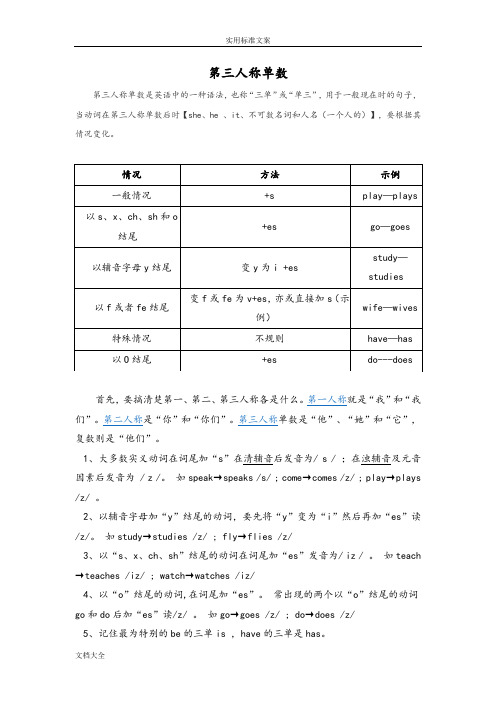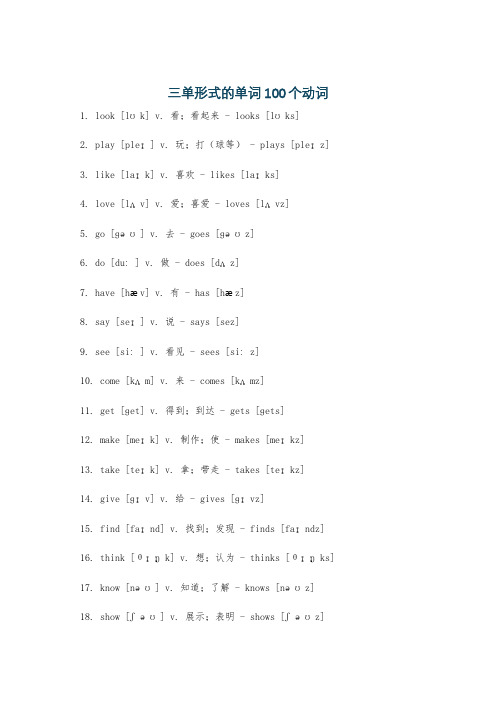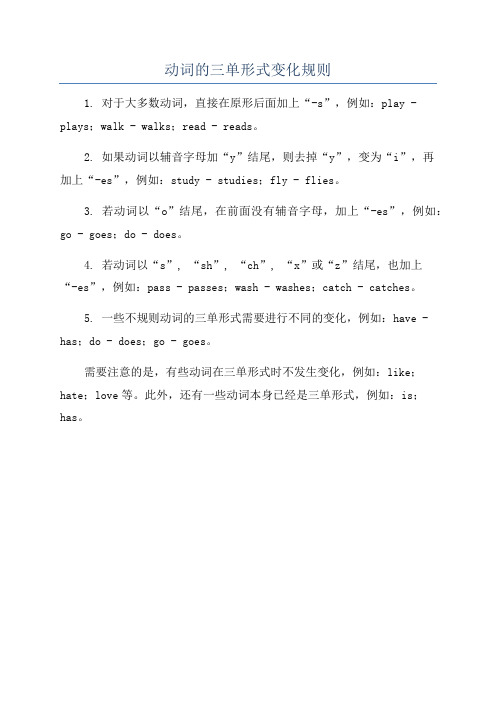三单形式
第三人称单数形式

第三人称单数是英语中的一种语法,也称“三单”或“单三”,用于一般现在时的句子,当动词在第三人首先,咱们要搞清楚第一、第二、第三人称各是什么.第一人称就是“我”和“我们”.第二人称是“你”和“你们”.第三人称单数是“他”、“她”和“它”,复数则是“他们”、“她们”和“它们”.在一般现在时中,当主语是第三人称单数时,谓语动词要用第三人称单数形式,即常在动词原形后加s或es.下面我们归纳一下第三人称单数的用法:一、人称代词he, she, it是第三人称单数.如:He likes watching TV. 他喜欢看电视.She has lunch at twelve. 她十二点吃午餐.It looks like a cat. 它看起来像只猫.二、单个人名、地名或称呼作主语;是第三人称单数.如:①Han Mei looks like her mother. 韩梅看起来像她的母亲.②Beijing is in China. 北京在中国.③Uncle Wang often makes cakes. 王叔叔常常做蛋糕.三、单数可数名词或"this/that/the+单数可数名词"作主语时,是第三人称单数.如:①A horse is a useful animal. 马是有用的动物.②This book is yours. 这本书是你的.③That car is red. 那辆小汽车是红色的.④The cat is Lucy's. 这只猫是露茜的.四、不定代词someone, somebody, nobody, everything, something等及指示代词this, that作主语时,是第三人称单数.如:①Everyone is here. 大家到齐了.②There is something wrong with the watch. 这块手表有弊端.③This is a pen. 这是一支钢笔.④That is an eraser. 那是一块橡皮擦.五、不成数名词作主语时为第三人称单数.如:①The milk is in the glass. 牛奶在玻璃杯里.②The bread is very small. 那面包很小.六、当数字或字母作主语时,看做第三人称单数.如:②"I" is a letter. "I"是个字母.二、把下列动词变成第三人称单数形式.1. clean—2. go3. have4. do5. play6. fly—7. come—8. brush 9. watch 10. study 11. ask 12. answer 13. swim 14. catch 15. write 16. eat 17. make 18. paint 19. learn 20. phone21. run 22. hop 23. sing 24. pick 三、选出正确的答案:1. She (like / likes) to play football.2. He (like / likes) drinking milk.3. I (like / likes) to watch TV.4. We (like / likes) to play badminton.5. They (like / likes) to sing songs.6. She (read / reads) books every day.7. He (play / plays) computer games every day.8. It (listen / listens) to the radio every day.9. Linda (draw / draws) pictures every day.10. Jane and Linda (play / plays) football every day.1.He often ________(have) dinner at home.2.We _______(not watch) TV on Monday.3.Nick _______(not go) to the zoo on Sunday.4.______ they ________(like) the World Cup?5.What _______they often _______(do) on Saturdays?6._______ your parents _______(read) newspapers every day?7.The girl _______(teach) us English on Sundays.8.She and I ________(take) a walk together every evening.9.There ________(be) some water in the bottle.10.Mike _______(like) cooking.11.They _______(have) the same hobby.12.My aunt _______(look) after her baby carefully.13.You always _______(do) your homework well.14.I _______(be) ill. I’m staying in bed.15.She _______(go) to school from Monday to Friday.16.Liu Tao _______(do) not like PE.17.The child often _______(watch) TV in the evening.18.Su Hai and Su Yang _______(have) eight lessons this term操练一、将括号里动词的适当形式填入横线上.1.He often ________(have) dinner at home.2.We _______(not watch) TV on Monday.3.Nick _______(not go) to the zoo on Sunday.4.______ they ________(like) the World Cup?5.What _______they often _______(do) on Saturdays?6._______ your parents _______(read) newspapers every day?7.The girl _______(teach) us English on Sundays.8.She and I ________(take) a walk together every evening.9.There ________(be) some water in the bottle.10.Mike _______(like) cooking.11.They _______(have) the same hobby.12.My aunt _______(look) after her baby carefully.13.You always _______(do) your homework well.14.I _______(be) ill. I’m staying in bed.15.She _______(go) to school from Monday to Friday.16.Liu Tao _______(do) not like PE.17.The child often _______(watch) TV in the evening.18.Su Hai and Su Yang _______(have) eight lessonsthis term.19. He________ TV every evening. (watch)20.John ________ like his father. (look)I ________ in the corridors. (walk)l He _________ in the corridors. (run) l She ___________ her face once a day. (wash)l They ____________ their teeth oncea day. (brush)l You ___________ up your clothesonce a day. (hang)l We ____________ our home work oncea day. (finish)l He ____________ rubbish in the classroom. (throw)l She _____________ rubbish on the floor. (throw)l I _____________ rubbish in the bin. (throw)l They ___________ the table once a day. (set)l Peter never _________ in the corridors. (run)l Mary usually _________ the table. (set)l Pat and Ken _________ the plants in the morning. (water)l The boy __________ his hair once a day. (comb)l Miss Cheng _________ TV at home. (watch)l My sister __________ his schoolbag once a day. (pack)l My mother _________ dinner for me. (cook)l My parents _________ the house at Chinese New Year. (clean)l My teachers _________ us some gifts. (give)l My friends _________ the table with me. (set)操练二、选择正确的单词填到括号里.1. What does Candy __________(wants,want) to be ?2. You __________ (should,shouldn’t)be quiet in the library.3. He shouldn’t ___________(throw,throws) rubbish on the floor.4. Peter ___________ (help,helps) his mother at home.5. She never _________ (run,runs) in the corridors.6. We should __________ (walks,walk) in the corridors.7. He _________ (don’t,doesn’t) get up early.8. How often __________ (do,does) your father go to bed?操练三、将下列句子改成第三人称He的句型(看例句)例句:I brush my teeth once a day.改:He brushes his teeth once a day.1.I comb my hair twice a day.2.They go to school at six in the morning.3.You wash your face and put on your clothes.4.When do you get up?5.How often do you hang up your clothes?操练四1. He __________(watch) TV every day.2. He _________(go) to school on his bike.3. Dad _________(wash) the dishes for us every day.4. My uncle _________(not go) fishing at the weekends.5. My brother _______(not like) playing football.6. The twin brother _________(enjoy) going to the concert.7. One of the students often __(do) his homework after 10 p.m. It is wrong.8. Lucy often ________(chat) with Millie.9. Tom usually ______(have) a fast breakfast in the morning so he ____(feel) hungry early.10. _______ he ________ (go) bed early?Yes, he _______.11. The sunshine ________(bring) us warmth(温暖).12. Sam usually _________(fly) kites with his father in May.13. Sometimes the little boy_________(cross) the road himself.14. Nick _______(miss) a turn because he is late.15. Sandy _______(study) harder than before.16. My parents often _______(let) me choose what to do.17. ________ Amy _________(close) the window? No, she ________.18. The little girl often ________(cry).19. _______ she _______(help) you ________(do) some cleaning on Sunday?20. He often ___(do) some ____(shop) or___(listen) to music with his family.操练六句型转换1. I go to school by bus. (用He做主语)2. Kim plays baseball very well. (变一般疑问句)3. She plays sports every day. (变否定句)4. David doesn’t like French. (变必定句)5.They like watches. (变否定句)6.Alan doesn’t watch TV on school nights. (变必定句)7. We have time to do it. (变否定句)8.John has a car. (对划线部分提问)9. Do you have a pencil? (把主语改成she)10.Sonia Hall likes hamburgers .(划线部分提问)操练七、填空,根据括号内的单词写出其正确的形式.1. We often ______ (play) in the playground.2. He ______ (get) up at six o’clock.3. My mother __________(have) a nice book.4. That music ________(sound) good.5. ________ you ________(have) a tennis racket?6. Mark sometimes _____ (go) to the park with his sister.7. She ________(play) sports every day.8. _______ Mike_______ (read) English every day?9. Can you ________(bring) your new picture books here?10. ________ your friend ________(like) sports?。
英语“三单形式”详解

第三人称单数[注意]a、下面两个动词变三单时,原词的元音部分的发音发生了较大的变化,要记忆。
如do/du:/ →does/dʌz/ ; say/sei/ → says /sez/ 。
b、以不发音字母“e”结尾的开音节词,如果尾音是[s][z]时加“s”后字母“e”发音与所加“s”一起读做[iz]。
如: close→closes [iz]。
在中文中第三人称单数的三个“他”写法不一样,读音却相同。
但在英语中,三个“他”既有不同的读音,也有不同的写法,分别是he, she, it。
在第三人称后不能使用动词的原形,而要在相应的动词后加s或es。
简单地讲,一个人就是单数,多于一个人就是复数。
在咱们汉语里,第三人称复数也就是常说的“他们”或者“她们”,英语中就是they.而“第三人称单数”就是指的“他”或者“她”,在英语中,相对应的就是he 或者she句子举例:第三人称单数: He is a student. (他是学生)第三人称复数: They are students.(他们是学生)以上只是一种帮助你理解的简单回答,第三人称还包括一些其他的方面,比如“it”等,这里就不多说了,希望你在学习中多多体会。
在一般现在时中,当主语是第三人称单数时,谓语动词要用第三人称单数形式,即常在动词原形后加-s或-es。
下面归纳一下第三人称单数的用法:一、人称代词he, she, it是第三人称单数。
如:He likes watching TV. 他喜欢看电视。
She has lunch at twelve. 她十二点吃午餐。
It looks like a cat. 它看起来像只猫。
二、单个人名、地名或称呼作主语;是第三人称单数。
如:①Han Mei looks like her mother. 韩梅看起来像她的母亲。
②Beijing is in China. 北京在中国。
③Uncle Wang often makes cakes. 王叔叔经常做蛋糕。
第三人称单数形式

第三人称单数形式第三人称单数是英语中的一种语法,也称“三单”或“单三”,用于一般现在时的句子,当动词在第三人称后时:情况方法示例一般情况+s let-lets;get-gets以s、x、ch、sh和o结尾+es pass-passes;fix-fixes;watch-watches;teach-teaches wash-washes;go-goes;do-does以辅音字母+y结尾变y为i +es study—--studies 以元音字母+y结尾直接+s play-----plays特殊情况不规则have—--has be—--is首先,咱们要搞清楚第一、第二、第三人称各是什么。
第一人称就是“我”和“我们”。
第二人称是“你”和“你们”。
第三人称单数是“他”、“她”和“它”,复数则是“他们”、“她们”和“它们”。
在一般现在时中,当主语是第三人称单数时,谓语动词要用第三人称单数形式,即常在动词原形后加-s或-es。
下面我们归纳一下第三人称单数的用法:一、人称代词he, she, it是第三人称单数。
如:He likes watching TV. 他喜欢看电视。
She has lunch at twelve. 她十二点吃午餐。
It looks like a cat. 它看起来像只猫。
二、单个人名、地名或称呼作主语;是第三人称单数。
如:①Han Mei looks like her mother. 韩梅看起来像她的母亲。
②Beijing is in China. 北京在中国。
③Uncle Wang often makes cakes. 王叔叔经常做蛋糕。
三、单数可数名词或"this/that/the+单数可数名词"作主语时,是第三人称单数。
如:①A horse is a useful animal. 马是有用的动物。
②This book is yours. 这本书是你的。
③That car is red. 那辆小汽车是红色的。
三单形式语法知识点

三单形式语法知识点一、知识概述《三单形式语法知识点》①基本定义:三单形式就是在一般现在时中,当主语是第三人称单数(he/she/it或者单个的人名、地名、物名等)的时候,动词要发生一定的变化。
比如,“like”这个动词,在主语是第三人称单数时,就变成“likes”。
②重要程度:在英语语法里非常重要,这是正确使用一般现在时表达句子意义的关键部分。
要是没掌握好三单形式,很多一般性描述第三人称单数的句子语法就会出错。
③前置知识:得先知道什么是第三人称,像he、she、it以及Jane、China这些所有单独表示一个人、地方、事物的。
还有一般现在时的基本概念,即经常发生的动作或者存在的状态。
④应用价值:在日常英语交流还有英语写作里都经常要用到。
比如描述一个人的习惯爱好,“He plays basketball every day.”(他每天打篮球),要是不懂三单形式就会写成“He play basketball every day.”,那句子就错了。
二、知识体系①知识图谱:在英语语法体系中,它是一般现在时这个分支中的一个重要规则部分。
②关联知识:与主语的单复数知识相关联,还和动词的时态知识有联系,因为不同的时态对于动词形式有不同的规则。
③重难点分析:- 掌握难度:对于初学者有点难,因为汉语里没有这样的动词变化习惯。
像我刚开始学英语的时候,老是忘记把动词变成三单形式,总觉得加个“s”或者“es”特别奇怪。
- 关键点:要能够准确判断主语是不是第三人称单数。
比如“the boys”是复数就不需要用三单形式,但是“the boy”是单数就得用。
④考点分析:在英语考试里是必考内容。
经常出现在选择题、填空题和书面表达中。
像是“Tom____ (go) to school by bike.”这种填空题,就得填“goes”,要是填“go”就错了。
三、详细讲解【理论概念类】①概念辨析:三单形式只用于一般现在时,而且是针对第三人称单数的主语才生效的动词变化形式。
三单形式的单词100个动词

三单形式的单词100个动词1. look [lʊk] v. 看;看起来 - looks [lʊks]2. play [pleɪ] v. 玩;打(球等) - plays [pleɪz]3. like [laɪk] v. 喜欢 - likes [laɪks]4. love [lʌv] v. 爱;喜爱 - loves [lʌvz]5. go [ɡəʊ] v. 去 - goes [ɡəʊz]6. do [duː] v. 做 - does [dʌz]7. have [hæv] v. 有 - has [hæz]8. say [seɪ] v. 说 - says [sez]9. see [siː] v. 看见 - sees [siːz]10. come [kʌm] v. 来 - comes [kʌmz]11. get [ɡet] v. 得到;到达 - gets [ɡets]12. make [meɪk] v. 制作;使 - makes [meɪkz]13. take [teɪk] v. 拿;带走 - takes [teɪkz]14. give [ɡɪv] v. 给 - gives [ɡɪvz]15. find [faɪnd] v. 找到;发现 - finds [faɪndz]16. think [θɪŋk] v. 想;认为 - thinks [θɪŋks]17. know [nəʊ] v. 知道;了解 - knows [nəʊz]18. show [ʃəʊ] v. 展示;表明 - shows [ʃəʊz]19. work [wɜːk] v. 工作 - works [wɜːks]20. study [ˈstʌdi] v. 学习 - studies [ˈstʌdiz]21. try [traɪ] v. 尝试 - tries [traɪz]22. fly [flaɪ] v. 飞 - flies [flaɪz]23. cry [kraɪ] v. 哭;叫喊 - cries [kraɪz]24. buy [baɪ] v. 买 - buys [baɪz]25. sell [sel] v. 卖 - sells [selz]26. tell [tel] v. 告诉 - tells [telz]27. write [raɪt] v. 写 - writes [raɪts]28. read [riːd] v. 读 - reads [riːdz]29. run [rʌn] v. 跑 - runs [rʌnz]30. swim [swɪm] v. 游泳 - swims [swɪmz]31. sing [sɪŋ] v. 唱歌 - sings [sɪŋz]32. dance [dɑːns] v. 跳舞 - dances [ˈdɑːnsɪz]33. jump [dʒʌmp] v. 跳 - jumps [dʒʌmpz]34. walk [wɔːk] v. 散步;步行 - walks [wɔːkz]35. talk [tɔːk] v. 谈话 - talks [tɔːkz]36. listen [ˈlɪsn] v. 听 - listens [ˈlɪsnz]37. watch [wɒtʃ] v. 观看 - watches [ˈwɒtʃɪz]38. brush [brʌʃ] v. 刷 - brushes [brʌʃɪz]39. wash [wɒʃ] v. 洗 - washes [ˈwɒʃɪz]40. clean [kliːn] v. 打扫;清洁 - cleans [kliːnz]41. open [ˈəʊpən] v. 打开 - opens [ˈəʊpənz]42. close [kləʊz] v. 关闭 - closes [kləʊzɪz]43. drive [draɪv] v. 驾驶 - drives [draɪvz]44. ride [raɪd] v. 骑 - rides [raɪdz]45. draw [drɔː] v. 画画 - draws [drɔːz]46. eat [iːt] v. 吃 - eats [iːts]47. drink [drɪŋk] v. 喝 - drinks [drɪŋkz]48. sleep [sliːp] v. 睡觉 - sleeps [sliːps]49. wake [weɪk] v. 醒来 - wakes [weɪkz]50. sit [sɪt] v. 坐 - sits [sɪtɪz]51. stand [stænd] v. 站 - stands [stændz]52. begin [bɪˈɡɪn] v. 开始 - begins [bɪˈɡɪnz]53. end [end] v. 结束 - ends [endz]54. help [help] v. 帮助 - helps [helps]55. teach [tiːtʃ] v. 教 - teaches [ˈtiːtʃɪz]56. learn [lɜːn] v. 学习 - learns [lɜːnz]57. borrow [ˈbɒrəʊ] v. 借(入) - borrows [ˈbɒrəʊz]58. lend [lend] v. 借(出) - lends [lendz]59. forget [fəˈɡet] v. 忘记 - forgets [fəˈɡets]60. remember [rɪˈmembə(r)] v. 记得 - remembers [rɪˈmembəz]61. break [breɪk] v. 打破;弄坏 - breaks [breɪks]62. fix [fɪks] v. 修理 - fixes [fɪksɪz]63. use [juːz] v. 使用 - uses [juːzɪz]64. lose [luːz] v. 失去;丢失 - loses [ˈluːzɪz]65. win [wɪn] v. 赢;获胜 - wins [wɪnz]66. lose [luːz] v. 输 - loses [ˈluːzɪz]67. miss [mɪs] v. 想念;错过 - misses [ˈmɪsɪz]68. need [niːd] v. 需要 - needs [niːdz]69. want [wɒnt] v. 想要 - wants [wɒntz]70. plant [plɑːnt] v. 种植 - plants [plɑːntz]71. cut [kʌt] v. 切;割 - cuts [kʌtɪz]72. put [pʊt] v. 放 - puts [pʊtɪz]73. stay [steɪ] v. 停留;待 - stays [steɪz]74. leave [liːv] v. 离开 - leaves [liːvz]75. arrive [əˈraɪv] v. 到达 - arrives [əˈraɪvz]76. carry [ˈkæri] v. 携带;搬运 - carries [ˈkæriz]77. push [pʊʃ] v. 推 - pushes [pʊʃɪz]78. pull [pʊl] v. 拉 - pulls [pʊlɪz]79. answer [ˈɑːnsə(r)] v. 回答 - answers [ˈɑːnsəz]80. ask [ɑːsk] v. 问 - asks [ɑːskɪz]81. call [kɔːl] v. 打电话;称呼 - calls [kɔːlɪz]82. email [ˈiːmeɪl] v. 发电子邮件 - emails [ˈiːmeɪlz]83. text [tekst] v. 发短信 - texts [teksts]84. cook [kʊk] v. 做饭 - cooks [kʊkz]85. bake [beɪk] v. 烘焙 - bakes [beɪkz]86. fry [fraɪ] v. 油炸 - fries [fraɪz]87. boil [bɔɪl] v. 煮 - boils [bɔɪlz]88. taste [teɪst] v. 品尝 - tastes [teɪsts]89. smell [smel] v. 闻起来;闻 - smells [smelz]90. feel [fiːl] v. 感觉 - feels [fiːlz]91. touch [tʌtʃ] v. 触摸 - touches [ˈtʌtʃɪz]92. see off [siːɒf] v. 送行 - sees off [siːz ɒf]93. pick up [pɪk ʌp] v. 捡起;接(某人) - picks up [pɪk ʌp]94. put on [pʊt ɒn] v. 穿上 - puts on [pʊt ɒn]95. take off [teɪk ɒf] v. 脱下;起飞 - takes off [teɪk ɒf]96. turn on [tɜːn ɒn] v. 打开(电器等) - turns on [tɜːn ɒn]97. turn off [tɜːn ɒf] v. 关闭(电器等) - turns off [tɜːn ɒf]98. look for [lʊk fɔː(r)] v. 寻找 - looks for [lʊk fɔːz]99. wait for [weɪt fɔː(r)] v. 等待 - waits for [weɪt fɔːz]100. depend on [dɪˈpend ɒn] v. 取决于;依靠 - depends on [dɪˈpend ɒn]。
动词的三单形式变化规则

动词的三单形式变化规则
1. 对于大多数动词,直接在原形后面加上“-s”,例如:play - plays;walk - walks;read - reads。
2. 如果动词以辅音字母加“y”结尾,则去掉“y”,变为“i”,再
加上“-es”,例如:study - studies;fly - flies。
3. 若动词以“o”结尾,在前面没有辅音字母,加上“-es”,例如:go - goes;do - does。
4. 若动词以“s”, “sh”, “ch”, “x”或“z”结尾,也加上
“-es”,例如:pass - passes;wash - washes;catch - catches。
5. 一些不规则动词的三单形式需要进行不同的变化,例如:have - has;do - does;go - goes。
需要注意的是,有些动词在三单形式时不发生变化,例如:like;hate;love等。
此外,还有一些动词本身已经是三单形式,例如:is;has。
英语“三单形式”详细讲解
第二人称单数第三人称单数是英语中的一种语法,也称二单”或单三”,用于一般现在时的句子,当动词在第三人称单数后时She、he、it、不可数名词和人名(一个人的)】,要根据其情况变化。
首先,要搞清楚第一、第二、第三人称各是什么。
第一人称就是我”和我们”。
第二人称是你”和你们”。
第三人称单数是他”、她”和它”,复数则是他们”。
1、大多数实义动词在词尾加“在清辅音后发音为/ S / ;在浊辅音及元音因素后发音为/ z /。
如 speak—speaks /s/ ; come —comes /z/ ; play —plays /z/ 2、以辅音字母加“ y吉尾的动词,要先将“变为“然后再加“ e读7z/ /如study—studies /z/ ; fly —flies /z/3、以“ sx、ch、sh结尾的动词在词尾加“ e发音为/ iz /teach —teaches /iz/ ; watch —watches /iz/4、以“ 0吉尾的动词,在词尾加“ es ”常出现的两个以“(结尾的动词go和do 后力卩“ es读/z/ 。
如 go—goes /z/ ; do —does /z/5、记住最为特别的be的三单is , have的三单是has。
[注意]a、下面两个动词变三单时,原词的元音部分的发音发生了较大的变化,要记忆。
如 do/du:/ —does/d?z/ ; say/sei/ —says /sez/b、以不发音字母“结尾的开音节词,如果尾音是[s][z]时加“后字母“发音与所加“s一起读做[iz]。
女口:close —closes [iz]在中文中第三人称单数的三个他”写法不一样,读音却相同。
但在英语中,三个他”既有不同的读音,也有不同的写法,分别是he, she, it。
在第三人称后不能使用动词的原形,而要在相应的动词后加s或es。
简单地讲,一个人就是单数,多于一个人就是复数。
在咱们汉语里,第三人称复数也就是常说的他们”或者她们”,英语中就是they.而第三人称单数”就是指的他”或者她”,在英语中,相对应的就是he或者she 句子举例:第三人称单数:He is a student.(他是学生)第三人称复数:They are students.(他们是学生)以上只是一种帮助你理解的简单回答,第三人称还包括一些其他的方面,比如“等:这里就不多说了,希望你在学习中多多体会。
动词的三单形式变化规则
动词的三单形式变化规则
1.一般情况下,动词直接加上-s。
例如:speak(讲话)→ he speaks(他讲话);run(跑步)→ she runs(她跑步)
2. 动词如果以-s、-ch、-sh、-x、-o结尾,要加上-es。
例如:pass(通过)→ it passes(它通过);watch(观看)→ she watches(她观看)
3. 动词如果以辅音字母+y结尾,要将y变为i,再加上-es。
例如:study(学习)→ he studies(他学习);try(尝试)→ she tries(她尝试)
4. 以“be”开头的动词“have”和“go”在第三人称单数形式中变化为“is”和“goes”。
例如:he has(他有)→ she has(她有);he goes(他去)→ she goes(她去)
需要注意的是,以上规则虽然适用于大多数情况,但仍有一些例外,例如一些不规则动词(如have、do等)就不按照上述规则变化。
因此,在学习时还需要额外注意这些特殊动词的变化形式。
三单形式的变化规则
三单形式的变化规则
《动词第三人称单数形式的奇妙变化》
嘿呀,各位小伙伴们!今天咱就来讲讲动词三单形式的那些事儿哟!
先来说说啥是动词三单形式呢,就是当主语是第三人称单数的时候呀,动词就得有特殊的变化啦。
那哪些是第三人称单数呢?嘿嘿,像他、她、它,还有单个的人名、地名等等这些哦。
那动词三单形式到底咋变呢?听好啦!一般情况下呀,直接在动词后面加 s 就好啦,比如 like 变成 likes,play 变成 plays。
但也有特殊情况哦,有些动词要加 es 呢,像 watch 就得变成 watches,go 变成 goes。
还有些呀,得把 y 变成 i 再加 es,像 study 就变成 studies。
可别小瞧这些变化呀,要是弄错了,那可就闹笑话啦!比如说,“他喜欢苹果”要是写成“He like apples”,那可就不对咯,得是“He likes apples”才行呀!再比如,“她每天去学校”,就得是“She goes to school every day”,而不是“She go to school every day”哟!
哎呀呀,大家可得记好了这些规则,不然说话、写句子的时候就会出糗啦!想象一下,要是你说错了,别人会不会笑你呀?哈哈,所以咱可得认真对待哟!
而且呀,在平时学习和使用的时候,要多留意多练习呢。
看到一个句子,就想想里面的动词三单形式对不对。
和小伙伴交流的时候,也可以互相考考,这样就能记得更牢啦!
总之呢,动词三单形式虽然有点小麻烦,但只要咱用心去学,就一定能掌握好哒!大家加油哦,让我们一起把动词三单形式玩得团团转!嘿嘿,就说到这儿啦,小伙伴们快去试试吧!。
三单形式
第三人称单数是英语中的一种语法,也称“三单”或“单三”,是语言中对对话双方外其它某一个人指示时使用的代词。
第三人称是相对于对话是,某一句话中,言语发出方()和言语的听受方()以外的其它人称。
单数是指该句中提到的其它人是一个人,相对于两个人(双数,在土着语言中广泛存在的双数)或更多人()。
如汉语中的“他”、“她”、“它”,英语中的he、she、it、him、her。
在英语教学中,第三人称单数除了指英语中这一套代词外,也指这一套代词的相关语法。
1基本介绍第三人称单数是英语中的一种语法,也称“三单”或“单三”,用于的句子,当动词在第三人称单数后时【she、he 、it、和人名(一个人的)】,要根据其情况变化。
通常加s/es2变化规则情况方法示例一般情况+s play—plays 以s,x,,sh和o结尾+es go—goes 以,,y结尾变y为i,+es ,—studies以f或者fe结尾变f或fe为v+es,亦或直接加s(示例),—wives特殊情况have—has以O结尾+es do---does3用法示例首先,咱们要搞清楚第一、第二、各是什么。
就是“我”和“我们”。
是“你”和“你们”。
是“他”、“她”和“它”,则是“他们”。
1、大多数在词尾加“s”在后发音为/ s / ;在及元音因素后发音为 / z /。
如speak→speaks /s/ ; come→comes /z/ ; play→plays /z/ 。
2、以辅音字母加“y”结尾的动词,要先将“y”变为“i”然后再加“es”读/z/。
如study→studies /z/ ; →flies /z/3、以“s、x、ch、sh”结尾的动词在词尾加“es”发音为/ iz / 。
如→teaches /iz/ ; →watches /iz/4、以“o”结尾的动词,在词尾加“es”。
常出现的两个以“o”结尾的动词go和do 后加“es”读/z/ 。
如go→goes /z/ ; do→ /z/5、记住最为特别的be的三单is ,have的三单是has。
- 1、下载文档前请自行甄别文档内容的完整性,平台不提供额外的编辑、内容补充、找答案等附加服务。
- 2、"仅部分预览"的文档,不可在线预览部分如存在完整性等问题,可反馈申请退款(可完整预览的文档不适用该条件!)。
- 3、如文档侵犯您的权益,请联系客服反馈,我们会尽快为您处理(人工客服工作时间:9:00-18:30)。
动词原形变第三人称单数的规则与发音规律同名词单数变复数大致相同。
1、大多数动词在词尾加“S”在清辅音后发音为[s],在浊辅音及元音后发音为[z]。
如:
①stop-stops [s] ; make-makes [s]
②read-reads [z] ; play-plays [z]
2、以辅音字母加“y”结尾的,要先将“y”变为“i”,然后在加“es”读[iz] 如:
fly-flies [z];carry-carries [z]
study-studies [z]; worry-worries
3、以“s, x, ch, sh”结尾的,在词尾加“es”,发音为[iz] 如:
teach-teaches [iz]; watch-watches [iz]
4、以“o”结尾的动词,加“es”,读[z] 如:
go-goes [z] do-does [z]
哪些主语是第三人称单数? 现归纳总结如下:
一、人称代词he, she, it是第三人称单数。
如:
二、He likes watching TV. 他喜欢看电视。
he has lunch at twelve. 她十二点吃午餐。
It looks like a cat. 它看起来像只猫。
二、单个人名、地名或称呼作主语;是第三人称单数。
如:
①Han Mei looks like her mother. 韩梅看起来像她的母亲。
②Beijing is in China. 北京在中国。
③Uncle Wang often makes cakes. 王叔叔经常做蛋糕。
三、单数可数名词或"this / that / the+单数可数名词"作主语时,是第三人称单数。
如:
①A horse is a useful animal. 马是有用的动物。
②This book is yours. 这本书是你的。
③That car is red. 那辆小汽车是红色的。
④The cat is Lucy's. 这只猫是露茜的。
四、不定代词someone, somebody, nobody, everything, something等及指示代词this,
that作主语时,是第三人称单数。
如:
①Everyone is here. 大家到齐了。
②There is something wrong with the watch. 这块手表有毛病。
③This is a pen. 这是一支钢笔。
④That is an eraser. 那是一块橡皮擦。
五、不可数名词作主语时为第三人称单数。
如:
①The milk is in the glass. 牛奶在玻璃杯里。
②The bread is very small. 那面包很小。
六、当数字或字母作主语时,看作第三人称单数。
如:
①"6" is a lucky number. "6"是个吉利数字。
②"I" is a letter. "I"是个字母。
Unit 6 Asking the way
Conversation 1
Excuse me,where is the nearest bank?
There is one next to the post office round the corner. Thank you.
Conversation 2
Excuse me,is there a hotel nearby?
The nearest one is about ten minutes' walk from here.
How can I get there?
Just walk down this road and you'll find it.
It's on the right side.
Conversation 3
Conversation 3
Can you tell me the way to the library? Sure.Turn left at the next crossing.
Is it on Xinhua Street?
yes.You can't miss it.
Additional useful expressions
I'm lost.Could you tell me where I am?
What's the name of this street?
这条街叫什么名字?
Where am I on this map?
我在地图上的什么地方?
Sorry,I'm new here myself.
对不起,我也不是本地人.
Where's the restroom?
洗手间在哪儿?
Is it far?
远吗?
At the end of the street.
在街尽头.
Turn right at the traffic light.
在红绿灯处向右拐.
Is there a shortcut to that place?
到那儿有近道吗?。
